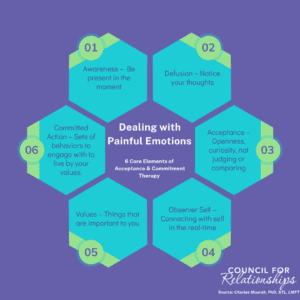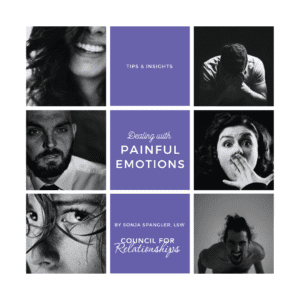Dealing with Painful Emotions: Insights & Tips
In “Dealing with Painful Emotions,” CFR Staff Therapist Sonja Spangler, LSW, explores the inevitability of emotional pain and offers practical strategies for managing it. Through mindfulness, cognitive reframes, and self-awareness, you can learn to navigate your feelings with compassion, transforming suffering into opportunities for growth and healing.
New Perspectives on Painful Emotions
The Buddhists say, “Life is suffering.” I remember when I first learned this, I felt strangely validated: life is supposed to be hard. I had fallen into the trap where I believed that to experience unhappiness was to assume I was an unhappy person. To hear that “life is suffering” felt like a refreshing truth to counter the phoniness of social media accounts which convince you that a permanent state of happiness is accessible.
With this new perspective on dealing with painful emotions, I was allowed to experience pain and unhappiness. It made me open up to those feelings with greater acceptance rather than seeing them as evidence of my failures. It made me more present with my emotions without feeling like I had to “fix” them. Developing self-awareness and emotional health can help in navigating these feelings effectively.
We must accept that painful feelings are inevitable, but how we relate to those feelings is within our control. The key to this process is to simply be willing to experience painful emotions first. The second is to not judge them as “bad.” I recognize that these are easier said than done, so here are some ideas to help you get there.
Mindfulness and Emotions: Staying Grounded
The first is a practice of mindfulness and emotions: stay grounded in the current context of your emotions and keep the feeling in the moment. Beware of making broad generalizations based on your current state of mind.
You can achieve this by making simple cognitive reframes. Some examples of this might be: “I feel like I messed up that social interaction” versus “I am socially inept.” Or “I feel hurt by this person’s actions” versus “People are always out to get me.” The latter statements might be stories or insecurities that you carry with you from the past. Those are valid and worth caring for.
If you focus on your insecurities, you can use your self-awareness to remove the judgment and say, “This is one of those days when I’m not feeling good enough.” The point is to honor your feelings while framing them as temporary states. You can have a day where you are not feeling good enough while also knowing that you will be able to access your confidence again.
Managing Anxiety and Emotions: Listening to Painful Emotions
Maybe you are experiencing painful emotions related to a broader problem in your life that you believe needs fixing. Perhaps you’re feeling dissatisfied in your relationship or like your anxiety is starting to significantly impact your well-being. Your painful emotions are pointing you towards parts of your life where you’d like to grow or improve.
Managing anxiety and emotions is crucial for your overall well-being. Painful emotions serve a function, and that is one of them. Listen to those messages rather than despairing over them. Take note of the problem and revisit it when you feel more grounded and able to access problem-solving skills. Don’t try to solve the problem while you’re experiencing emotional pain.
Like a mentor of mine once said, “You’re not going to plan tomorrow’s dinner when you’re feeling sick to your stomach.” Just like you would if you were sick, focus on taking care of yourself during moments of emotional pain rather than trying to “fix” the problem.

Infographic by Council for Relationships. Click here to learn more.
Acceptance and Commitment Therapy: Understanding Pain
Pain is evidence of problems in our lives; sometimes, it is evidence of good things. One well-known line in Acceptance and Commitment Therapy (ACT) says, “We hurt where we care.”
If that doesn’t resonate, we can always return to 8th-grade physics class with Newton’s Third Law: “Every action has an equal and opposite reaction.”
Let’s take grief as an example: the depth of the pain you feel having lost someone is equal and opposite to the depth with which you loved them. If you take away your grief, you would also necessarily be taking away the depth of your love. Therefore, can you be willing to experience the pain of grief even though it hurts? Understanding this is key to grief and emotional pain management.
Cognitive Reframes: Navigating Fear and Insecurity
So often, I hear clients describe a “tug-of-war” between something they want versus the fear involved in getting there: “Apply for the job” versus “You’re never going to get it.” They try to fight the pain of fear and insecurity, but it’s always there, tugging at the rope’s end. Sometimes, the fear of rejection feels so scary that it wins the tug-of-war and convinces us not to act.
I always invite my clients to put the rope down and let the two sides work together – it’s much less exhausting. Experience the fear of rejection simultaneously as you apply for the job. Being willing to experience fear means opening yourself up to taking risks and growing.
Compassionate Emotional Processing: Growing Through Pain
I have to make space for the cliché that going through painful things makes you grow. Think of yoga as an example. You physically put yourself into uncomfortable positions, but you don’t judge them – you suffer through them and try to breathe into them. When it’s over, you leave being literally a little taller and stronger.
Everyone has the ability to experience painful emotions in a way that is compassionate and productive. Developing a better relationship with your pain does not mean you won’t hurt. You will hurt. But it also doesn’t mean you are broken, unhappy, or destined for failure. It means you are a normal person experiencing life’s suffering. How do you want to make use of that?
Therapy for Emotional Pain: Seeking Professional Help
If you find yourself struggling with dealing with painful emotions, consider seeking help from a therapist. Therapy for emotional pain can provide you with tools and strategies to navigate these challenging feelings. Compassionate emotional processing is a skill that can be developed with the right support.
Don’t hesitate to request a therapist appointment for emotional health with a Council for Relationships therapist to start your journey toward better emotional health.

CFR Staff Therapist Sonja Spangler, LSW
About Philadelphia Therapist Sonja Spangler, LSW
Sonja Spangler, LSW, is a Staff Therapist at the Council for Relationships who sees individuals, couples, and families in Philadelphia, Paoli, PA, and online. Contact her to book an appointment.
Let CFR’s over 85 individual, couples, and family therapy experts help you deal with painful emotions and other mental health conditions. See our Therapist & Psychiatrist Directory for CFR therapists or psychiatrists near you.
If this is an emergency, please call 911 or contact the National Suicide Prevention Lifeline by dialing 988.
More Mental Health Blogs from CFR
CFR’s therapists, psychiatrists, and other mental health professionals offer much more to explore! Check out the CFR Expert Voices blog for great mental and emotional health advice on topics such as managing negative thoughts, feeling overwhelmed, learning relaxation techniques, or navigating relationships with family members. To get first access to our Expert Voices blog, join our mailing list!

